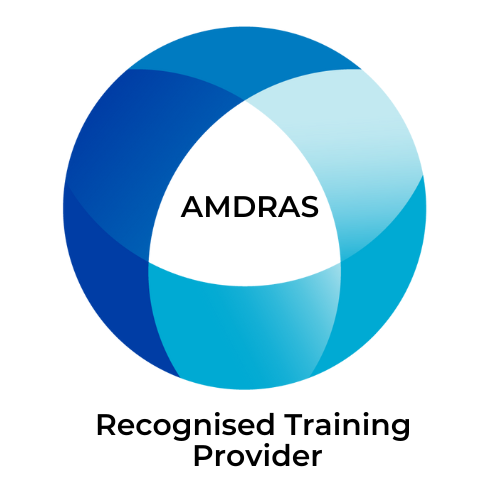
NATIONALLY ACCREDITED MEDIATOR TRAINING
- National accreditation
- Role-plays, simulations and case studies
- Taught by industry experts
- Credit towards a postgraduate FDRP qualification
Please select your course and click 'Add to Cart'
National Mediation Assessment – Oct ‘25 (AMDRAS) |
Start / End Dates
23 October 2025
-
24 October 2025
|
Workshop Dates
23-24 October 2025
|
Workshop Location
This program will be conducted entirely online.
|
CN251001_PSK1A $1,200.00 |
|||||
|
|||||||||
Nationally Accredited Mediator Training Program – Oct ‘25 (AMDRAS) |
Start / End Dates
27 October 2025
-
31 October 2025
|
Workshop Dates
27-31 October 2025
|
Workshop Location
This program will be conducted entirely online.
|
CN251002_PSK1T $2,990.00 |
|||||
|
|||||||||
National Mediation Assessment – Nov ‘25 (AMDRAS) |
Start / End Dates
20 November 2025
-
21 November 2025
|
Workshop Dates
20-21 November 2025
|
Workshop Location
This program will be conducted entirely online.
|
CN251101_PSK1A $1,200.00 |
|||||
|
|||||||||
Nationally Accredited Mediator Training Program – Feb ‘26 |
Start / End Dates
09 February 2026
-
13 February 2026
|
Workshop Dates
9 - 13 February 2026
|
Workshop Location
This program will be conducted entirely online.
|
CN260201_PSK1T $2,990.00 |
|||||
|
|||||||||
Advanced Mediator Practicum Certificate - Feb '26 |
Start / End Dates
25 February 2026
-
26 February 2026
|
Workshop Dates
25 - 26 February 2026
|
Workshop Location
College of Law, Level 4, 570 George Street, Sydney 2000
|
CN260201_PSK1P $1,600.00 |
|||||
|
|||||||||
National Mediation Assessment – Mar ‘26 |
Start / End Dates
12 March 2026
-
13 March 2026
|
Workshop Dates
12 - 13 March 2026
|
Workshop Location
This program will be conducted entirely online
|
CN260301_PSK1A $1,200.00 |
|||||
|
|||||||||
Nationally Accredited Mediator Training Program – Mar ‘26 |
Start / End Dates
16 March 2026
-
20 March 2026
|
Workshop Dates
16 - 20 March 2026
|
Workshop Location
This program will be conducted entirely online
|
CN260302_PSK1T $2,990.00 |
|||||
|
|||||||||
National Mediation Assessment – Apr ‘26 |
Start / End Dates
-
20 April 2026
|
Workshop Dates
20 - 21 April 2026
|
Workshop Location
This program will be conducted entirely online.
|
CN260401_PSK1A $1,200.00 |
|||||
|
|||||||||
OVERVIEW
Nationally Accredited Mediator Training Program and Assessment
Are you looking to enhance your qualifications with mediation skills or ready to step up as a Nationally Accredited Mediator? Our comprehensive training program and assessment offers you a path to national accreditation, combining convenience, practical experience, and expert instruction.
Key aspects of our program:
- Accreditation: Our course is fully compliant with the current AMDRAS standards, ensuring you receive a nationally recognised qualification.
- Convenience: Participate in a five-day practical workshop via videoconference, followed by a 2-day assessment including a day of mediation theory and review.
- Immediate practicality: Learn to mediate disputes through real-world scenarios and immersive role-plays.
- Reputation: Benefit from the expertise of Australasia’s most highly regarded faculty of mediation trainers, coaches, and assessors. Whether you aim for formal accreditation or wish to develop valuable mediation skills, our program is designed to meet your needs.
- Advanced option: Already accredited? The Advanced Mediator Practicum Certificate is available for experienced mediators who want to deepen their skills and work towards Advanced Mediator accreditation under AMDRAS.
- Changes to mediator accreditation - What you need to know with Linda Kochanski AM
COURSE STRUCTURE
The Nationally Accredited Mediator Training Program consists of five days of an intensive workshop conducted via video conferencing and preparatory reading material and online interactive activities, to be completed prior to the workshop. You will also need to complete written activities post workshop. You’ll learn through role-play and practice – while being guided by accredited mediation professionals.
During your training, you’ll learn the fundamental principles of mediation, including impartiality and confidentiality, as well as a range of conflict resolution and negotiation strategies. You’ll also explore the ethical standards and legal frameworks integral to mediation.
Program outline:
- Days one and two: Introduction to mediation, models of mediation, pre-mediation intake and conflict analysis, facilitative model, stages of mediation and complexities (impasses, power imbalance, ethical dilemmas)
- Days three, four and five: Nine role plays over three days where participants act as mediators, oral and written feedback, group debriefing, large group sessions addressing participant questions, and patterns, complexities and issues observed by the instructors
Workshop times
9am to 5.30pm (Australian Eastern Time) each day (7.5 hours per day, breaks not included)
Participants seeking formal Nationally Accredited Mediator status will also need to complete the National Mediation Assessment. For further information on how to do this, please contact our Customer and Student Engagement team on Tel 02 9965 7111 or email cpd@collaw.edu.au
For practitioners seeking National Mediation Accreditation, the National Mediation Assessment consists of one day of mediation theory and review to prepare you for your full day of role-play assessment conducted via video conferencing. You will have the opportunity to ask any last-minute questions. You will also be required to complete a written assessment on the learning portal following the completion of the workshop.
Workshop times
- Thursday (9am to 4.30pm Australian Eastern Time): Review of mediation models and theory
- Friday (9am to 4.30pm Australian Eastern Time): Role-play assessment
Prerequisite: You must have successfully completed a Nationally Accredited Mediator Training Program or its equivalent within the required timeframe to undertake/enrol in a National Mediation Assessment.
Enhance your career and differentiate yourself amongst mediation professionals by becoming an Accredited Advanced Mediator under the new Australian Mediator and Dispute Resolution Accreditation Standards (AMDRAS).
Our Advanced Practicum Certificate course is your pathway to being accredited as an Advanced Mediator.
To complete the Practicum Certificate, you must be an Accredited Mediator for at least four (4) years (two complete renewal cycles) and have completed at least 150 practice hours.
This course is largely driven by the participants with reflections, discussions, role plays, simulations and other exercises that are derived from the experience of the participants and their case study examples. It is a dynamic and rewarding course for any experienced mediator who is passionate about their craft and wanting to share, learn and hone their skills.
The Practicum Certificate course focusses on advanced and complex issues that mediators face in practice. Course objectives include –
- Identifying practice barriers and challenges in mediation and methods to overcome them
- Identifying and demonstrating a sophisticated understanding of the purpose, techniques and skills required for each stage of the mediation process
- Awareness of socio-cultural issues when mediating with culturally and linguistically diverse communities, indigenous Australians and other diverse groups and communities, including LGBTIQA+, and consideration of neurodiversity
- Identifying and demonstrating the characteristics of a mindful and reflective mediator
- Discussing and reflecting on mediation experiences in a constructive and supportive environment
The Advanced Mediator Practicum Certificate course has 3 components:
- Submission of a case study at least 2 days prior to the commencement of the workshop. The case study will be submitted via the learning portal and materials and resources will be provided to you via the learning portal as well
- A 2-day, in-person workshop, at the College’s Sydney HQ
- Assessment – To complete the Practicum Certificate, participants must demonstrate an understanding of the course objectives and how to navigate complex issues in mediation with a written assignment that draws on the workshop content. The assessment is due within seven (7) days of the completion of the workshop and has an 800-1000-word limit.
Upon successfully completing all course requirements, a Practicum Certificate will be awarded enabling you to seek Advanced accreditation via your Recognised Accreditation Provider (RAP).
The College of Law is a Recognised Training Provider (RTP) under AMDRAS.
Linda Kochanski AM, LLB, Nationally Accredited Mediator (AMDRAS), FDRP, Senior Practice Leader, Dispute Resolution, The College of Law
Linda Kochanski was admitted as a Solicitor in Queensland, initially specialising in Family and Criminal Law. She gained extensive experience in various areas of law but discovered a particular interest in family law and mediation.
Linda subsequently worked for Relationships Australia in various roles including Branch Manager, Coordinator of Mediation and Senior Consultant in Mediation. She has practised in all forms of relationship mediation. Linda continues to practice mediation as a private practitioner specialising in relationship mediation.
Linda has been a Tutor and Lecturer since 1991 working initially as a tutor with QUT. Linda has worked as a Lecturer in Professional Legal Education for Griffith and Bond Universities as well as holding the position of Co Director Bond University Dispute Resolution Centre. She has also positions with the Australian Mediation Association and the University of Southern Queensland.
Linda is a former director (2016 to 2024) of the AMDRAS Board and is an invited consultant for 2025. She is also Co Director of Global Training and Professional Development Ltd.
Linda has presented at national and international conferences on Mediation and Family Law and has published in these areas as well and has received industry awards for her work as a FDRP and DR Academic.
Bianca Keys, Biance Keys Dispute Resolution Consulting
Bianca Keys is a highly experienced Mediator (AMDRAS accredited), Facilitator, Trainer and Conflict Management Coach. She has been working as a dispute resolution practitioner since 2004, and as a mediation trainer since 2005.
Bianca operates her own consultancy, specialising in mediation and conflict management services for commercial, workplace and healthcare disputes. She was a Director on the Mediator Standards Board from 2014-2022 and Chairperson between 2019-2021. The Mediator Standards Board oversaw the previous National Mediator Accreditation System and established the revised Australian Mediator and Dispute Resolution Accreditation System (AMDRAS).
Bianca has diverse experience designing and implementing industry dispute resolution schemes. She has worked with Federal Government and Industry in the design and management of DR processes for the Australian franchising, horticulture, retail, petroleum, film exhibition, and wine making industries.
Bianca has delivered mediation training in Australia, the United Kingdom, Thailand, Malaysia, Hong Kong, China, the Philippines, and Bahrain. This variety has given her the opportunity to work with different cultures and to develop a broad understanding of training and accreditation needs. In addition, Bianca designs and delivers tailored conflict management and resolution skills workshops for organisations, and professional development workshops for mediators and conciliators.
Bianca has a legal background, although she now works solely as an ADR professional. She has been appointed to a number of mediation and conciliation panels, including the NSW Health Care Complaints Commission, NSW Small Business Commission, NSW Personal Injury Commission, NSW Farm Debt Mediation, the Australian Wine Industry Code, the Australian Disputes Centre, and the Australian Small Business and Family Enterprise Ombudsman (Franchising and Small Business Disputes).
Bianca is a frequent contributor to industry publications and conferences and is consulted for her expertise in effective communication,
The College of Law can provide in-house mediation training aligned with the Australian Mediator and Dispute Resolution Accreditation Standards (AMDRAS) for organisations in Australia and worldwide.
Whether you seek AMDRAS accreditation or mediation skills training for your staff, contact us to coordinate everything from enrolment to completion. The course can be delivered online or on-site at certain College campuses.
For more information, please contact
Email: b2b@collaw.edu.au
The Mediation Training Program, Assessment and Advanced Mediator Practicum Certificate courses comply with the mandatory requirement of Professional Skills.
If you intend to claim CPD units for this educational activity, please note that CPD activities are not accredited by the Law Society of NSW or any other equivalent local authority, with the exception of Western Australia. If you hold a practising certificate in a state or territory other than Western Australia and this educational activity extends your knowledge and skills in areas that are relevant to your practice needs or professional development, then you should claim one (1) “unit” for each hour of attendance, refreshment breaks not included. The annual requirement is ten (10) CPD units each year from 1 April to 31 March. Some practitioners, such as accredited specialists are required to complete more than ten (10) units each CPD year.
Practitioners holding WA practising certificates are not eligible to earn CPD points for this course.
College alumni are entitled to save 10% off the fee for this course. Use ALUMNI10 at the checkout.

The structure of the course was fantastic: theory up front, practice Wed-Fri worked well. Fantastic coaches and tutors!
Mediator Training Alumni

Program was delivered clearly in a well-structured way and the teachers and coaches were very good at sharing their experiences.
Mediator Training Alumni

The course was well-structured and covered key topics that are required to become accredited. The explanations given from the facilitators were clear and concise. No question was left unanswered and all care was taken to ensure understanding.
Mediator Training Alumni

The program was great, lots of information and the sessions were very informative and useful. The coordinators were excellent and coaches were helpful.
Mediator Training Alumni

A fabulously intensive and involved course. Learnt so very much and it will not only make me a better lawyer but a better person. A great course!
Mediator Training Alumni
HAVE QUESTIONS? LET'S CHAT!
Need more information? Schedule a conversation with one of our
Customer Engagement Advisors, at a time that suits you.
FREQUENTLY ASKED QUESTIONS
Step 1: Complete one of our nationally accredited mediator training programs.
Learn about the theory of mediation and develop your mediation skills through role-play, practice, and feedback. Find a training program from the courses listed above.
Step 2: Successfully complete the national mediation assessment.
Unique to The College of Law, we offer a full-day of mediation theory and review to prepare you for your assessment. The assessment must be done within one year of the training course. Find upcoming assessment dates from the courses listed above.
Step 3: Submit your application to a Recognised Accreditation Provider (RAP).
Once you have successfully completed your assessment, you will need to submit your application to an RAP within six months. Find a RAP
Solicitor members of The Law Society of New South Wales who have successfully completed the assessment are eligible to apply for mediator accreditation under the Lawyer Mediator Accreditation Scheme (LMA Scheme). Please click on this link for further information.
Step 4: Once approved, your name will be added to the Register of Nationally Accredited Mediators.
You will have one year (12 months) from the completion date of your mediator training, although we recommend completing an assessment within three months of your training program.
Accreditation must be sought out within 6 months from the completion date of your mediation assessment.
Certificates are usually issued within 2-3 weeks after completion of program/assessment.
The College of Law is not an RAP. While the course comprehensively covers the academic requirements for AMDRAS accreditation, you will need to join an RAP for official accreditation.
Once you are AMRDAS accredited with a registered RAP, you will be listed on the Mediation Standards Board National Register. You will then be able to promote yourself as a AMDRAS accredited mediator, and the public will be able to verify your accreditation by referring to the National Register.
Yes, but only for the training program. It’s important to know you are still required to successfully complete the assessment.
If you withdraw 10 days prior to commencement, a full refund of the enrolment fee will be available.
If you transfer or withdraw within 10 days of commencement, a fee of $400 will be applied. And if you withdraw on the day of commencement, you are not eligible for a refund.
Terms and conditions
We encourage you to download Zoom prior to the course commencing. The download is free. Visit https://zoom.us/
You can download the course manual here to access detailed information about the course structure, assessment criteria, and additional resources.

































